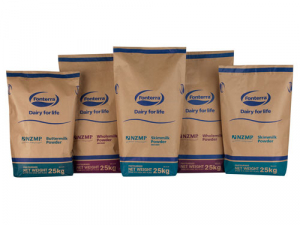Mid-Canterbury dairy farmer boosts milksolids by 50% with millennial mindset
A Mid-Canterbury dairy farmer is bringing a millennial mindset to his family farm and is reaping the rewards, with a 50% uplift in milksolids production since he took over.
 Milk powder rose $48 million in value in January 2017, despite the quantity exported falling by around 19,000 tonnes or 9.4%.
Milk powder rose $48 million in value in January 2017, despite the quantity exported falling by around 19,000 tonnes or 9.4%.
Milk powder rose $48 million in value in January 2017, despite the quantity exported falling by around 19,000 tonnes or 9.4%, Statistics New Zealand says.
Milk powder, which made up 56% of the milk powder, butter, and cheese commodity group in January 2017, more than offset lower sales for other goods, leaving overall exports up 0.3% or $13 million.
When compared to the same period of the previous year, milk powder exports have risen in the last four months, after generally falling since September 2009.
“The recent rises in the value of dairy shows exporters are getting a better price for their milk powder exports than they were at this time last year,” international statistics senior manager Daria Kwon said.
“The fall in milk powder quantity this month reflects this, with exporters getting more value for less product.”
China continues to be our top destination for milk powder exports, accounting for 32% of milk powder exports in January 2017, followed by the United Arab Emirates, which accounted for 7.6%.
Crude oil, meat, and fruit all rose in January 2017. These rises were partly offset by falls in other commodities, such as casein, wool, and logs.
The trade balance for January 2017 was a deficit of $285 million. Excluding crude oil exports and imports, the deficit was $36 million.
The third edition of the NZ Dairy Expo, held in mid-February in Matamata, has shown that the KISS principle (keep it simple stupid) was getting a positive response from exhibitors and visitors alike.
Twenty years ago, South African dairy farm manager Louis Vandenberg was sent to a farm in Waikato to provide training on Afimilk technology.
Strong farmgate milk price is helping boost investment on farms, says PGG Wrightson chief executive Stephen Guerin.
Fonterra's 460 milk suppliers in Australia, who will switch to Lactalis end of this month, are unfazed with the impending change.
The 5+ A Day Charitable Trust has launched a collection of affordable recipes designed to turn everyday vegetables into seasonal stars.
Jane Mellsopp has been confirmed as the new Government Appointee to the New Zealand Meat Board (NZMB).